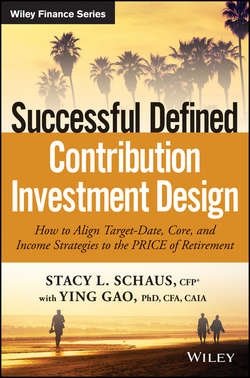Читать книгу Successful Defined Contribution Investment Design - Gao Ying - Страница 17
На сайте Литреса книга снята с продажи.
PART ONE
DC Plans: A Cornerstone of Retirement
CHAPTER 1
DC Plans Today: An Overview of the Issues
HIRING AN INVESTMENT CONSULTANT
ОглавлениеDC investment consulting is a growing profession. In PIMCO’s 2016 Defined Contribution Consulting Support and Trends Survey, the 66 participating DC consultant and advisory firms reported serving over 11,000 plan sponsor clients who together represent combined plan assets of over $4.2 trillion. These firms say they provide a broad range of services, including investment policy development and documentation, investment design, recordkeeping searches, and total plan cost or fee studies. Nearly all said they are willing to serve as a 3(21) nondiscretionary advisor – that is, they will make recommendations with respect to which investments a plan sponsor may want to select. The majority of consultants also are willing to serve in a 3(38) discretionary fiduciary capacity over such functions as manager selection, glide path oversight, and investment management. This allows the consultant to make decisions for the plan sponsor, such as which investment managers to hire. Consultants expect continued growth in discretionary services for clients, as clients may initially hire the consultant as a nondiscretionary advisor and then migrate the consultant to a discretionary role.
While hiring a consultant can help fulfill a plan’s fiduciary duty, it is important to note that plan sponsors are not necessarily protected by going with the consultant’s recommendation (no matter how well-documented that decision may be). In commenting on a recent lawsuit that followed a line of decisions that held that “independent expert advice is not a ‘whitewash,’” Fleckner said: “The court explained that a fiduciary who relies on an expert, like a consultant, should make certain that reliance on the expert’s advice is reasonably justified under the circumstances. The court cautioned that the sponsor cannot reflexively and uncritically adopt investment recommendations.”
Ultimately, plan sponsors may take a different direction than recommended by their consultant and still meet their fiduciary duty. In fact, “if the sponsor believes that the consultant’s recommendation is contrary to the interests of the plan and participants,” comments Fleckner, “or it believes that the consultant did not engage in a rigorous enough process, then the fiduciary may be obligated to reject the recommendation. As discussed with any fiduciary decision, the plan sponsor should document its rationale for taking action that differs from the consultant’s recommendation.”
